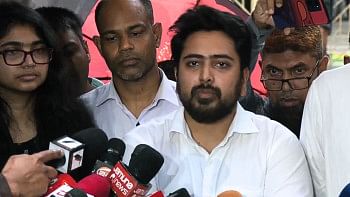Row over death figure
It still remains a matter of discussion exactly how many were killed by law enforcers while flushing out Hefazat-e Islam members from Motijheel early May 6, with very recently rights body Odhikar putting the death toll at 61.
The NGO published a report titled "Assembly of Hefazate Islam and Human Rights Violations" on June 10 after “conducting a fact-finding drive” and concluded that 61 people were killed.
Terming the report ill-motivated, police arrested Odhikar Secretary Adilur Rahman Khan in the capital's Gulshan on Saturday for publishing false information on casualties during the crackdown.
While Hefajat, a Qawmi madrasa-based organisation, and the BNP-led opposition alliance kept claiming that law enforcers killed hundreds in the drive, online propaganda continued supporting the claim.
Speaking at a press conference on May 6, hours after the Motijheel drive, BNP Vice-Chairman Sadeque Hossain Khoka said more than 1,000 Hefajat men were killed and the bodies were concealed.
Later on May 8, Dhaka Metropolitan Police Commissioner Benazir Ahmed told the media that 11 people, including a policeman, died during the May 5-6 unrest.
The Daily Star also has estimated that the number of casualties could be not more than 40.
Rights body HRW recently in a report said it believes that at least 58 people, including seven members of security forces, died on May 5 and 6.
The Odhikar report put the death toll at 61 but gives detailed information only about three of the deceased and one missing person.
It gave details about Mohammad Saidul Bari, 17, a student of Baitul Fozol Islamia Madrasa in Mohammadpur, Dhaka; Mawlana Mufti Mohammad Yunus, 32, a teacher of Forkhola Hafezia Madrasa in Daudkandi, and Moazzemul Haq Nannu, 35, from Khorki, Jessore.
According to the report, Mohammad Yunus's elder brother was informed around 6:00am on May 6 about the madrasa teacher's death by an unknown policeman, who claimed to have recovered the body from Motijheel.
Saidul Bari's cousin Ananya Sultana said in an interview published in the report that the teenager, heavily injured, was brought to Islami Bank Hospital around 7:00pm on May 5.
Nannu was found injured around 6:00am on May 6 by some people, who later hospitalised him. He succumbed to his injuries on May 11, his brother Hafez Md Hafizul Haq told Odhikar.
Furthermore, the report quoted family members of Monowar Siddiki, 28, an imam from Comilla, as saying he had been missing since the Hefajat held a rally at Shapla Chattar on May 5. He joined the rally and contacted his family members around 5:00pm the last time.
In addition, the report said Sekandar, an assistant at Dhaka Medical College morgue, notified Odhikar that a postmortem was carried out on the 16 bodies on May 6. Of them, two were policemen, two BGB personnel, and 11 others were civilians.
The report did not say whether the 11 victims were Hefajat men.
The information ministry in a letter, dated July 10, to Odhikar Director Nasiruddin Elan asked for the list of the 61 people and their names, addresses and family details.
In a reply to the ministry on July 17, Nasiruddin Elan refused to give the information, citing inadequate victim protection laws.
The NGO urged the government to "form a neutral Investigation Commission headed by a retired Judge of the Supreme Court of Bangladesh, after having discussion with human rights organisations, which are working to prepare the list of the deceased persons."
The organisation would "submit its in-depth fact finding mission report, including the detailed list of the deceased to the impartial, independent Investigation Commission".
Taskin Fahmina, senior researcher and programme coordinator of Odhikar, told this correspondent that it is a practice of human rights organisations not to disclose information on the victims to the state, if the state itself is an oppressor or violator of human rights, or if there is a concern regarding the security of the victims.
Talking to The Daily Star yesterday, eminent rights activist Sultana Kamal said, "If they [Odhikar] are making an allegation against the government, they are legally bound to provide justification.
“If they feared for the security of the victims and witnesses, they should have approached the matter through the court instead of addressing it in a letter to the information ministry.”
Khushi Kabir, coordinator of Nijera Kori, told The Daily Star that a human rights organisation can withhold information if they feel that it will jeopardise the lives of their clients.
The noted rights activist added, “The government's record has not always been clean regarding the protection of victims or witnesses ".

 For all latest news, follow The Daily Star's Google News channel.
For all latest news, follow The Daily Star's Google News channel. 



Comments